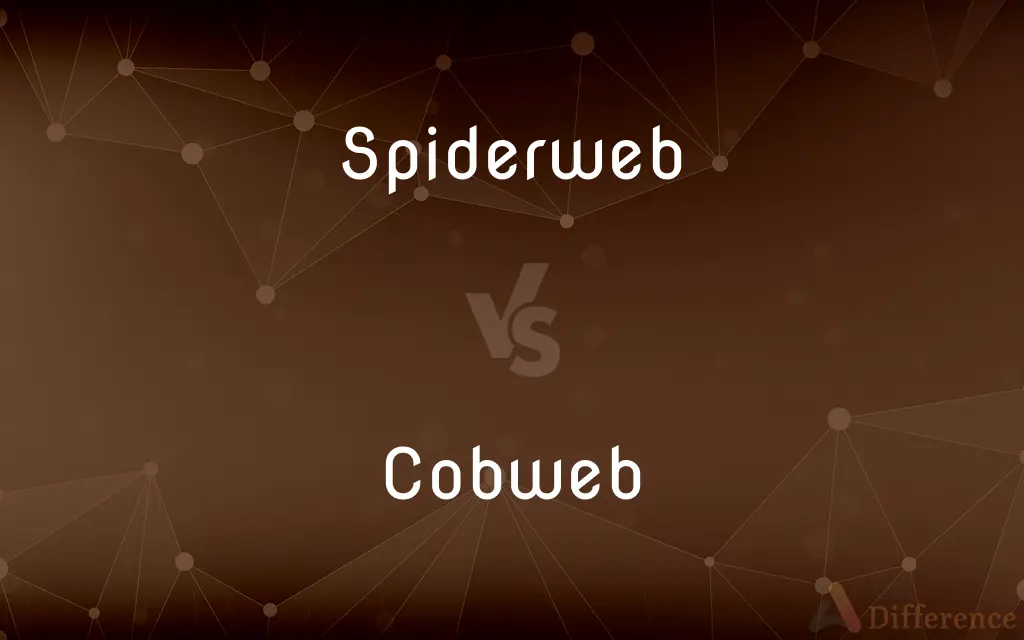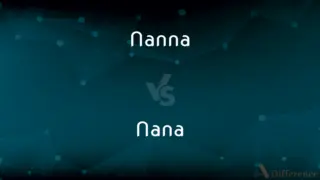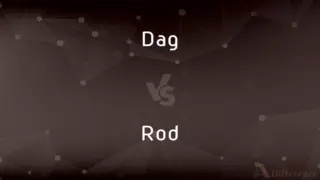Spiderweb vs. Cobweb — What's the Difference?
Edited by Tayyaba Rehman — By Fiza Rafique — Updated on October 25, 2023
A spiderweb is a structure created by a spider to catch prey, while a cobweb is an old, dusty spiderweb that's been abandoned.

Difference Between Spiderweb and Cobweb
Table of Contents
ADVERTISEMENT
Key Differences
A spiderweb is an intricate structure woven by spiders primarily to catch their prey. These webs can come in various shapes and sizes, depending on the species of spider. They're crafted using silk produced by the spider, which is both flexible and sticky. On the other hand, a cobweb specifically refers to old, abandoned spiderwebs that have accumulated dust over time. This term often carries the connotation of age and neglect.
Spiderwebs are marvels of natural engineering. When you see a freshly spun spiderweb glistening in the morning dew, you're looking at a structure designed for efficiency in trapping insects. Cobwebs, conversely, no longer serve this purpose. As they become old and abandoned, they lose their stickiness and effectiveness, turning into mere remnants of once-functional spiderwebs.
The word "spiderweb" emphasizes the creature that created it – the spider. It's a testament to the spider's skill and ingenuity. The term "cobweb" emphasizes age, disuse, and often neglect. When we refer to something as having cobwebs, we often mean it's been neglected or untouched for a long time.
In everyday language, the terms "spiderweb" and "cobweb" might be used interchangeably. However, when being precise, a spiderweb is any web made by a spider, while a cobweb is specifically an old, dusty, abandoned one. So, all cobwebs are spiderwebs, but not all spiderwebs are cobwebs.
Comparison Chart
Definition
A structure woven by spiders to catch prey
An old, abandoned, and dusty spiderweb
ADVERTISEMENT
Age and Use
Typically new and functional
Old, non-functional, and often neglected
Association
Directly associated with the spider's activity
Associated with age, neglect, and disuse
Common Usage
Refers to any web spun by a spider
Often used to describe neglected or seldomly visited areas
Functional Aspect
Sticky and efficient in trapping prey
Lost its stickiness and effectiveness
Compare with Definitions
Spiderweb
A structure created by spiders using silk.
The morning light made the spiderweb shimmer beautifully.
Cobweb
An old, dusty, and abandoned spiderweb.
The attic was full of cobwebs.
Spiderweb
A representation of intricacy and complexity.
The map looked like a spiderweb of roads and pathways.
Cobweb
A delicate pattern or design reminiscent of a spiderweb.
The dress had a lace pattern that looked like cobwebs.
Spiderweb
A term denoting something delicate yet strong.
The necklace had a spiderweb-like chain.
Cobweb
A network or tangle of something thin and delicate.
Cobwebs of doubt clouded her mind.
Spiderweb
A trap crafted by spiders to catch their prey.
An insect flew directly into the spiderweb.
Cobweb
A symbol of neglect or lack of use.
The old book was covered in cobwebs.
Spiderweb
A sign of spider activity in an area.
The presence of a spiderweb suggests there might be spiders nearby.
Cobweb
A spiderweb, especially an old one that is covered in dust.
Spiderweb
The silky web that a spider spins in order to catch its prey.
Cobweb
A single thread spun by a spider.
Spiderweb
The net-like construct of a spider containing sticky strands to catch prey.
Cobweb
Something resembling a spiderweb in gauziness or flimsiness
"An extraordinary number of elegant ladies ... flowed in, heels clicking, diamonds flashing, adjusting tiny cobwebs of priceless lace on immaculate coiffures" (Jane Stevenson).
Spiderweb
(figurative) Something that resembles a spider's web in being mesh-like, entrapping, or fragile.
Cobweb
An intricate plot; a snare
Caught in a cobweb of espionage and intrigue.
Spiderweb
(transitive) To connect or cover as if with spiderwebs.
Cobweb
Cobwebs Confusion; disorder
Cobwebs on the brain.
Cobweb
To cover with or as if with cobwebs.
Cobweb
A spiderweb, or the remains of one, especially an asymmetrical one that is woven with an irregular pattern of threads.
Cobweb
One of its filaments; gossamer.
Cobweb
(figurative) Something thin and unsubstantial, or flimsy and worthless; valueless remainder.
Cobweb
An intricate plot to catch the unwary.
Cobweb
A web page that either has not been updated for a long time, or that is rarely visited.
Cobweb
The European spotted flycatcher, Muscicapa striata.
Cobweb
The network spread by a spider to catch its prey.
Cobweb
A snare of insidious meshes designed to catch the ignorant and unwary.
I can not but lament thy splendid witEntangled in the cobwebs of the schools.
Cobweb
That which is thin and unsubstantial, or flimsy and worthless; rubbish.
The dust and cobwebs of that uncivil age.
Cobweb
The European spotted flycatcher.
Such a proud piece of cobweb lawn.
Cobweb
Filaments from a cobweb
Cobweb
A dense elaborate spider web that is more efficient than the orb web
Cobweb
A term used to describe a feeling of confusion or dizziness.
I woke up with cobwebs in my head this morning.
Common Curiosities
What is a spiderweb?
A spiderweb is a structure woven by spiders, primarily to catch prey.
Why do spiders create spiderwebs?
Spiders create spiderwebs primarily to trap and catch their prey.
What does it mean when someone says, "clear the cobwebs"?
It means to refresh or clear one's mind or to clean up a place.
Are spiderwebs durable?
Yes, spiderweb silk is incredibly strong for its thickness and can be very durable.
Are all cobwebs spiderwebs?
Yes, all cobwebs are spiderwebs, but not all spiderwebs are cobwebs.
Do cobwebs serve any purpose for spiders?
Cobwebs are abandoned spiderwebs that no longer serve their primary purpose.
How does a cobweb differ from a spiderweb?
A cobweb is an old, dusty, and abandoned spiderweb.
Can the term "spiderweb" have a metaphorical meaning?
Yes, "spiderweb" can metaphorically refer to something intricate or complex.
Why do cobwebs collect dust?
Because they're abandoned and no longer maintained by the spider, allowing dust to settle.
Are spiderwebs always sticky?
Most spiderwebs are sticky to effectively trap prey, but not all types are.
Can you find spiderwebs outdoors?
Yes, spiderwebs can be found both indoors and outdoors.
Why might someone refer to an old place as having "cobwebs"?
Referring to a place as having cobwebs implies it's been neglected or untouched for a long time.
What causes the abandoned look of cobwebs?
Cobwebs look abandoned due to the accumulation of dust and disuse over time.
Are spiderwebs only used for catching prey?
Primarily, yes, but spiders also use webs for shelter, protection, and mating displays.
Do all spiders create webs?
No, not all spiders weave webs; some hunt or ambush their prey.
Share Your Discovery

Previous Comparison
Nanna vs. Nana
Next Comparison
Dag vs. RodAuthor Spotlight
Written by
Fiza RafiqueFiza Rafique is a skilled content writer at AskDifference.com, where she meticulously refines and enhances written pieces. Drawing from her vast editorial expertise, Fiza ensures clarity, accuracy, and precision in every article. Passionate about language, she continually seeks to elevate the quality of content for readers worldwide.
Edited by
Tayyaba RehmanTayyaba Rehman is a distinguished writer, currently serving as a primary contributor to askdifference.com. As a researcher in semantics and etymology, Tayyaba's passion for the complexity of languages and their distinctions has found a perfect home on the platform. Tayyaba delves into the intricacies of language, distinguishing between commonly confused words and phrases, thereby providing clarity for readers worldwide.















































